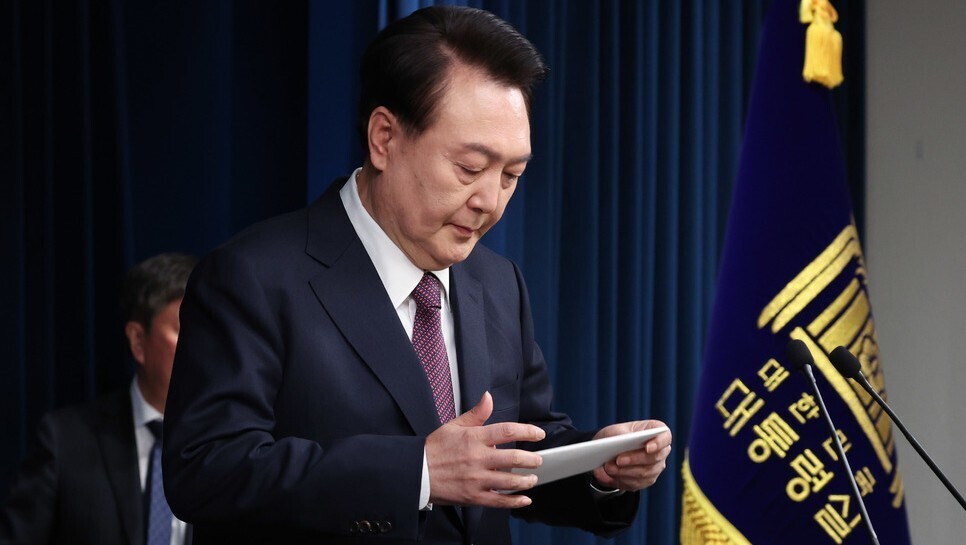hankyoreh
Links to other country sites 다른 나라 사이트 링크
[Column] Yoon’s oblivious diplomacy ended in expo rout – will it also fail to respond to N. Korea’s nukes?


President Yoon Suk-yeol has returned from his 16th trip overseas of his term thus far, a state visit to the Netherlands. But the self-styled “diplomacy president” and “No. 1 salesperson” façade that the presidential office has been leaning into has crumbled.
The World Expo bid ended in bitter failure, with South Korea losing out to Saudi Arabia 119 to 29. While Yoon faced public scrutiny over his excessive time spent out of the country, he carried out his state visit to the Netherlands, touting the creation of a so-called “semiconductor alliance” with the country all the while. However there have been reports that South Korea’s ambassador to the Netherlands was summoned by the Dutch government over excessive demands made by the presidential office surrounding Yoon’s visit.
It would be a relief if Yoon’s total diplomatic mishaps stopped here. The real diplomatic and security test is coming in 2024. The presidential office has said that North Korea plans to launch an intercontinental ballistic missile in the near future, meaning that tensions on the Korean Peninsula are likely to escalate rapidly from the very start of the new year.
Last month, South Korea suspended Article 1(3) of the Sept. 19 comprehensive military agreement it had signed with North Korea in 2018, effectively lifting the ban on aerial reconnaissance around the Military Demarcation Line. While this was supposedly done in response to North Korea’s launch of its military reconnaissance satellite, the Malligyong-1, it was in fact the culmination of a long-term pet project of the administration, which has criticized the agreement as the signature protocol of former President Moon Jae-in’s “false peace that relies on goodwill from North Korea,” and a political trump card aimed at conservative voters.
In response, North Korea immediately declared it was fully suspending the pact. These developments mean that there’s an extremely high risk that we’ll see a military clash between the two Koreas over propaganda-carrying balloon this coming spring, when the winds will be blowing northward.
The Yoon administration has vowed to demonstrate “peace through strength” based on the “powerful alliance” between the US and South Korea, and appears willing to take the risk of inter-Korean clashes. At a meeting of key military commanders, Defense Minister Shin Won-sik went so far as to say, “If North Korea does anything rash to harm peace, only the destructive fury of hell awaits it.”
At the second meeting of the US-South Korea Nuclear Consultative Group in Washington on Friday, the US and South Korea decided to hold their first nuclear operations exercise next August during the joint Ulchi Freedom Shield drills in response to North Korea’s nuclear and missile threats. This means that the US and South Korea will practice together for the first time in a scenario in which the US launches a nuclear retaliation in response to a North Korean nuclear attack.
The Yoon administration is confident that borrowing US power is enough to ensure that North Korea will not dare to take anything further, even in the event of a clash in the DMZ, and that the North Korean nuclear and missile crisis can be dealt with by strengthening US extended deterrence.
However, if South Korea thinks that leaning on American firepower is enough to solve the dire situation it faces, it is seriously mistaken. First of all, there is a very high probability that Donald Trump will win the US presidential election in November 2024. If he is reelected, Trump is considering a deal that would allow North Korea to keep its nuclear weapons and offer incentives in exchange for the freezing of its nuclear program, Politico reported last week.
Although Trump has denied the report, he has already tried to reach a similar agreement at the 2019 Hanoi summit. Trump may be willing to override South Korea’s wishes if he can get as much out of North Korea as he can sell to his voters.
Of course, the outcome of the US election is far from certain. However, experts believe that Biden will be more willing to negotiate with North Korea in a second term. This is because there is a growing consensus in Washington that North Korea’s rapid nuclear and missile programs and military cooperation with Russia are a threat to the US.
However, North Korea, which has invested heavily in its nuclear and missile programs over the past few years, is unlikely to respond to negotiations with only relief from sanctions on the table. It will demand an end to US-South Korean military exercises and a partial withdrawal of US troops from the peninsula. This is why South Korea needs to be proactive in its nuclear diplomacy and continue to consult with the US.
In the context of its efforts to contain China through trilateral cooperation between the US, South Korea, and Japan, the Biden administration values the Yoon administration’s willingness to overlook historical disputes to improve Seoul-Tokyo relations. However, if Yoon continues to brazenly stoke inter-Korean tensions, Biden might start viewing him as the second Netanyahu nightmare.
The US is already dealing with the Russia’s invasion of Ukraine and Israel’s invasion of Gaza, and it surely does not want another conflict sprouting up on the Korean Peninsula. Netanyahu’s hard-line campaign in Gaza has already resulted in mass slaughter and disaster, which has placed a burden on the US-led international order. Biden would not welcome another staunch hard-liner on the Korean Peninsula.
The Yoon administration is focused on enhancing the nuclear umbrella with the Nuclear Consultative Group, but it’s still the US commander-in-chief who ultimately decides whether or not to push the nuclear button. Domestically, there is a growing isolationist movement within the US that calls for an end to intervention in foreign affairs. In a situation where North Korea simultaneously threatens South Korea and the US with nuclear weapons, it’s highly unlikely that the US will sacrifice its own citizens to extend its umbrella to protect Korea.
Ultimately, South Korea needs a comprehensive strategy that not only strengthens our deterrence against North Korea’s nuclear threat, but also relieves tensions and prevents a further escalation. The president and his foreign policy and security advisers need to stay away from a hard-line approach. To contain North Korea-Russia military cooperation, we need to take relations with China more seriously while working to ensure ties between Pyongyang and Moscow don’t become any closer.
Busan failed in its bid to host the World Expo, a humiliating defeat of 119 to 29. Although everybody expected an overwhelming victory from Saudi Arabia, Yoon failed to grasp the situation and continued to waste foreign policy resources. This should set alarm bells ringing. Yoon’s overconfidence was likely exacerbated by his advisers’ failure to report the facts. If his negligence extends to North Korea and national security, he will endanger peace on the Korean Peninsula and countless Korean lives.
Please direct questions or comments to [english@hani.co.kr]

Editorial・opinion
![[Column] The miscalculations that started the Korean War mustn’t be repeated [Column] The miscalculations that started the Korean War mustn’t be repeated](https://flexible.img.hani.co.kr/flexible/normal/500/300/imgdb/original/2024/0630/9717197068967684.jpg) [Column] The miscalculations that started the Korean War mustn’t be repeated
[Column] The miscalculations that started the Korean War mustn’t be repeated![[Correspondent’s column] China-Europe relations tested once more by EV war [Correspondent’s column] China-Europe relations tested once more by EV war](https://flexible.img.hani.co.kr/flexible/normal/500/300/imgdb/original/2024/0628/7617195640940814.jpg) [Correspondent’s column] China-Europe relations tested once more by EV war
[Correspondent’s column] China-Europe relations tested once more by EV war- [Correspondent’s column] Who really created the new ‘axis of evil’?
- [Editorial] Exploiting foreign domestic workers won’t solve Korea’s birth rate problem
- [Column] Kim and Putin’s new world order
- [Editorial] Workplace hazards can be prevented — why weren’t they this time?
- [Editorial] Seoul failed to use diplomacy with Moscow — now it’s resorting to threats
- [Column] Balloons, drones, wiretapping… Yongsan’s got it all!
- [Editorial] It’s time for us all to rethink our approach to North Korea
- [Column] Why empty gestures matter more than ever
Most viewed articles
- 1[Column] The miscalculations that started the Korean War mustn’t be repeated
- 2Yoon echoed conspiracy theories about Itaewon disaster, former National Assembly speaker says
- 3Dreams of a better life brought them to Korea — then a tragic fire tore them apart
- 4Blaze at lithium battery plant in Korea leaves over 20 dead
- 5[Correspondent’s column] Who really created the new ‘axis of evil’?
- 6[Correspondent’s column] China-Europe relations tested once more by EV war
- 7[Editorial] Seoul failed to use diplomacy with Moscow — now it’s resorting to threats
- 8[Editorial] Exploiting foreign domestic workers won’t solve Korea’s birth rate problem
- 9CIA record confirms US ‘completely destroyed’ Seoul’s Haebangchon in 1950 bombardment
- 10Moscow tells Seoul to rethink ‘confrontational course’